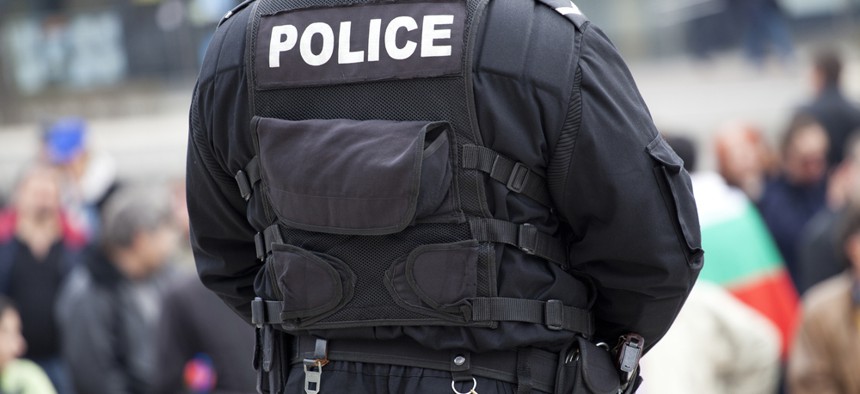When Cops Violate Civil Rights, It's City Taxpayers Who Pay

Michael Dechev / Shutterstock.com
Of $735 million in damages collected between 2006 and 2011, officers paid less than .02 percent.
We know criminal justice won't be served in the case of Eric Garner, at least at the local level. A Staten Island grand jury made sure of that Wednesday by failing to indict Daniel Pantaleo of the NYPD, whose videotaped chokehold led to Garner's death in the eyes of a city medical examiner. But the case is far from over: a federal investigation is planned, and the family reportedly has filed notice that it will sue the city for $75 million, a great sum if a shallow solace.
The latter claim may only lead to yet another injustice in the case—this one against New York City taxpayers. Because if history is any guide, it's not Pantaleo himself who's likely to foot the bill for civil compensation, or even the NYPD as a whole, but rather city residents.
Joanna Schwartz of UCLA Law School, who's analyzed police misconduct cases across the country, has found that police officers are "virtually always indemnified" against civil damages. As a result, she writes in a recent paper in the New York University Law Review, "taxpayers almost always satisfy both compensatory and punitive damages awards entered against their sworn servants." Schwartz tells CityLab she expects the Garner case to be no different.
"I do imagine the officers will be indemnified," she says. "If you look at big cases involving the NYPD that settled between 2006 and 2011, including suits relating to the shooting of Sean Bell, there was no contribution by involved officers. New York has required officers to contribute small amounts when officers have been found to be acting outside of policy. I suppose this could happen in this case, but feel fairly certain given my research about indemnification that the involved officers would, at most, be required to contribute a minuscule fraction of any amount collected by the family."
For her analysis (spotted recently by Aviva Shen at ThinkProgress), Schwartz collected data on civil rights settlements related to police misconduct from 44 large and 37 small or midsized police departments across the United States, covering the years 2006 to 2011. Altogether, these departments employ about 20 percent of the nation's officers.
The information showed that cops very rarely pay out of their own pockets for their civil-rights mistakes. In 9,225 cases in the large cities that were settled or judged for the victim, more than $735 million in damages were awarded. But officers personally paid less than $171,300 of that total—or just .02 percent. In the small or midsized cities, according to Schwartz's research, officers don't appear to have paid a penny of the roughly $9.4 million awarded to victims.
The pattern holds true even in jurisdictions that ostensibly prohibit or severely limit indemnification by law (including New York City), as well as when officers are disciplined or terminated by their department. Schwartz writes:
Despite the wide variation in indemnification statutes, there is little variation in outcome—officers almost never pay.
Of the 44 large police departments analyzed by Schwartz, the NYPD did by far hold the most officers personally accountable: 35 of the 38 or 40 total cops who weren't fully indemnified. (Only three to five of these departments heldanyone financially responsible, according to Schwartz's figures.) In 34 cases, New York City officers paid a total of $114,000—or .03 percent of all the money paid to local victims of civil rights violations during the six-year study window.The median personal payment from these cops came to $2,125.
The one time an NYPD officer paid a settlement in full—in this case, $16,500—was when he was off-duty and his dog attacked someone.

In 44 large U.S. cities, only 38 to 40 police officers paid any damages in civil rights cases settled or judged for the victim from 2006-2011; few paid more than $5,000. (Schwartz, 2014, NYU Law Review)
The situation persists despite the fact that civil rights doctrine relies on the assumption that cops who violate these rights will pay damages themselves, according to Schwartz. The fear of being sued is supposed to act as a deterrent to abuse of power by police (over and above, one hopes, any personal sense of morality). The law is also supposed to protect city residents from bearing responsibility for officer misconduct; as the Supreme Court has ruled, "[n]either reason nor justice suggests that such retribution should be visited upon the shoulders of blameless or unknowing taxpayers."
But that system is clearly broken. Here's Schwartz again (emphasis mine):
For several decades, the Supreme Court has crafted civil rights doctrines—including qualified immunity and limitations on municipal liability and punitive damages—based on unfounded assumptions, and many times has done so in ways that make it more difficult for plaintiffs to prevail. This Article rebuts one of those assumptions: that law enforcement officers are personally responsible for settlements and judgments entered against them.
Schwartz doesn't go so far as to suggest that cities should eliminate indemnification and make officers fully liable in these cases. First and foremost, such a policy might not help the victims, as most cops would go bankrupt long before they could pay up. Given how few city departments hold any officers responsible at all, argues Schwartz, New York's system of making some cops partially responsible might even be a step in the right direction. What's clear from the raw numbers, though, is that any such step made to date has still left quite a ways to go.
(Image by Michael Dechev / Shutterstock.com)





